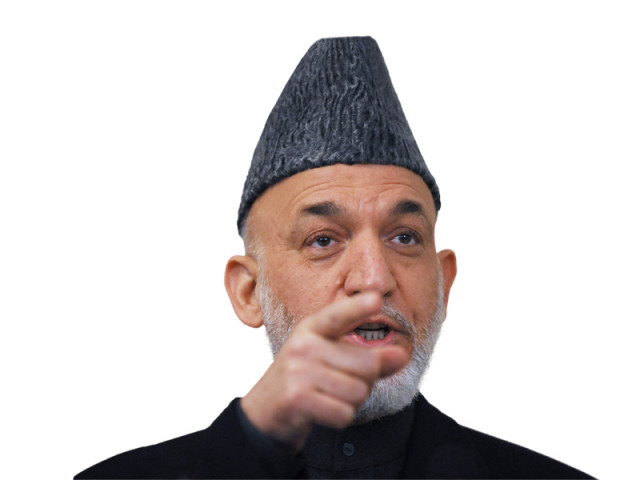Pakistan military strives to secure central Afghan role
Military scrambling to shore up ties with Karzai government as the beginning of a US military withdrawal draws closer.

Uneasy neighbours Pakistan and Afghanistan took an important step last weekend, agreeing to include Pakistani military and intelligence officials in a commission seeking peace with the Taliban, giving Pakistan's security establishment a formal role in any talks.
Relations between Pakistan and Afghanistan have been fraught for decades largely because Pakistan has seen successive Afghan governments as too close to its main enemy - India.
Pakistan's military has had long-running ties to the Afghan Taliban and has repeatedly said that the road to a settlement of the 10-year conflict in Afghanistan runs through Islamabad.
It has in the past frowned upon efforts by Kabul to independently launch dialogue with the Taliban and is unlikely to countenance a similar outreach by Washington to the insurgent group without its involvement.
In recent months, Pakistan has sought to improve relations with Afghan President Hamid Karzai as the United States begins its withdrawal in July, and regional powers including India jostle for influence.
"This is part of General Kayani's relentless outreach to President Karzai ever since the Obama administration announced withdrawal plans," said C. Raja Mohan, a prominent Indian foreign affairs expert, referring to Pakistani army chief, General Ashfaq Kayani.
Mohan said Karzai - who has often blamed Pakistan for fueling the insurgency in his country - had responded to the Pakistani military overtures because he saw Pakistan as his hope for survival once the United States leaves.
"Karzai is looking to his political future after the U.S. withdrawal and he has asked for 'Pindi's help to find a way to work things out with the Taliban," he added, referring to Pakistani army headquarters in the city of Rawalpindi.
Feelers have gone out between the Afghan government and Taliban sympathisers, although no formal peace process has begun.
At the same time, Afghanistan and Pakistan have turned to each other when their own relations with the United States are strained.
U.S. ties with Karzai have soured since his election was called into question and over corruption. Relations with Pakistan have suffered over covert U.S. actions, including missile attacks by drone aircraft that Washington says are necessary to hunt down al Qaeda and the Taliban and which Pakistan sees as a violation of its sovereignty.
Above all, driving the flurry of diplomacy is the worry that the United States will leave Pakistan to clean up the mess after it leaves, just as it did following the Soviet withdrawal from Afghanistan in 1989.
"As we're coming to the end game, it's created a sense of urgency for an opening for all sides to come back to the table," said Cyril Almeida, a columnist for Pakistan's Dawn newspaper.
But the question, he said, is whether the younger generation of Taliban commanders is war-weary or war-hardened, and how much authority supreme Taliban leader Mullah Mohammad Omar retains over them.
That uncertainty calls into question how much sway Pakistan itself has over the militants, given its ostensible abandonment of them in 2001 after an American ultimatum
Complicated ties
Pakistan's once close relationship with the Taliban – it was one of only three countries to recognize the brutal regime toppled by the United States in the wake of the Sept. 11, 2001, attacks - has become more complicated.
"The Taliban are not a manageable force anymore. The blowback that has happened in Pakistan, the whole insurgency.
They're really worried about the emboldening of characters on their side of the border," said Kamran Bokhari, Middle East and South Asia director for the global intelligence firm STRATFOR.
"They don't want the Talibanisation of Afghanistan," he said, referring to Pakistani leaders.
One scenario that Pakistan is working towards is a coalition government - perhaps similar to the one in Iraq - that sees the Taliban embedded in a political process that grants them a major say, but prevents them from taking over entirely, Bokhari said.
It is unclear if the United States would be happy with that, but it may have little choice given that a military victory looks impossible.
"Ultimately, the Americans don't like the idea that there should be some negotiations with the Haqqanis and Mullah Omar," Bokhari said, referring to the most dangerous Afghan Taliban faction.
"But it's in their interest to see a little bit of a load taken off their plate," he said, referring to a Pakistani role in pressing the Taliban to talk peace.
But before Pakistan can play a major role, it must overcome distrust in Afghanistan, and a belief that it will always see the Taliban as its long-term allies in achieving its aims, including keeping India at bay, analysts in Kabul say.
"One thing is clear," said Thomas Ruttig, co-director of the Afghanistan Analysts Network.
"Pakistan needs to play a more constructive role in Afghanistan. I don't see signs that Pakistan has given up its ideas of using the Taliban as an asset for post-2014 Afghanistan."



















COMMENTS
Comments are moderated and generally will be posted if they are on-topic and not abusive.
For more information, please see our Comments FAQ